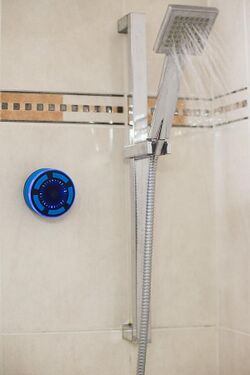Engineering:Shower speaker
A shower speaker is a Bluetooth speaker designed for use in humid environments such as showers or more generally in the bathroom. There are also shower speakers using Wi-Fi, although this is more rare.
Principle of operation
The speaker must first be paired with a Bluetooth device. In general, it is a smartphone or tablet. It is this device that will serve as the source for the music that will be played through the speaker.[citation needed]
Features and characteristics
Water resistance
A shower speaker must first of all be able to withstand water splashes. This resistance is expressed by an IP (Ingress Protection) index that must be mentioned on the product. The most frequent indexes encountered are the IPX4 index, which indicates that the device is protected against splashes. Other models offer superior protection, such as IPX7. In this case, the enclosure is completely submersible in water to a depth of 1 meter for half an hour.[citation needed] It is then considered waterproof. Some models, rarer those, extend their protection up to index 8.
Sound quality
The most basic models only offer an output power of 3W, which does not allow for an optimal sound quality. Mid-range models go up to 5W and high-end models can go up to 10W and beyond.[citation needed]
The number of speakers can also vary: while entry-level models are limited to a single speaker, more elaborate models can offer two, and thus have stereo sound reproduction. Some shower speakers add a passive radiator to improve low frequency reproduction and achieve deeper sound.[1]
Bluetooth
Recent models generally use Bluetooth 4.0 or even Bluetooth 5, and shower speakers generally have a range of 10 meters.[citation needed]
Some speakers may benefit from the NFC system to facilitate pairing with the source device.[citation needed]
Battery
Shower speakers use rechargeable batteries to power them. The operating time of the speaker before it has to be recharged is usually 6 hours. Models with more powerful batteries can last up to 10 hours or more.
In order to be recharged, shower speakers must be connected to an electrical source by means of a Micro Usb cable.[2] The complete charging cycle generally varies from 3 to 6 hours.
Mounting options
The shower speaker must be able to be installed in all environments. This is why manufacturers have planned to equip their devices with different ways of fixing them.
The suction cup is the most basic system and is found on entry-level speakers. Its main disadvantage is poor adhesion to the shower wall, which can cause the unit to fall off.
The mounting bracket is the safest system to fix the speaker, but requires drilling a hole in the wall.
The carabiner clip allows the speaker to hang from the shower curtain bar. It is only suitable for the smallest and lightest models.
Secondary characteristics
Integrated microphone
Most shower speakers have a built-in microphone, which allows to receive and make calls using a mobile phone in hands-free mode. When a call comes in, the music automatically shuts off and resumes as soon as the call ends.
Radio
Other models have an integrated FM radio. The higher end models add an LCD screen to make it easier to select and store radio stations.
Alexa or Google Home Pairing
With the development of voice assistants, manufacturers have integrated the ability to pair them with their devices. This way, commands can be passed to the speaker via the integrated microphone, which will then be executed by the voice assistant.[3]
See also
References
- ↑ "Q. What are the advantages of passive radiator design?". https://www.soundonsound.com/sound-advice/q-what-are-advantages-passive-radiator-design.
- ↑ "Help Guide | Charging the speaker from an AC outlet". https://helpguide.sony.net/speaker/srs-xb2/v1/en/contents/TP0001029999.html.
- ↑ "These Smart Speakers Do Your Bidding, And Have Killer Sound Quality" (in en-US). 2018-09-07. https://www.fatherly.com/gear/best-smart-speakers-alexa-google-assistant-and-siri-voice-assistants/.


